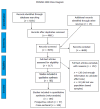Consequences of bullying victimization in childhood and adolescence: A systematic review and meta-analysis
- PMID: 28401049
- PMCID: PMC5371173
- DOI: 10.5498/wjp.v7.i1.60
Consequences of bullying victimization in childhood and adolescence: A systematic review and meta-analysis
Abstract
Aim: To identify health and psychosocial problems associated with bullying victimization and conduct a meta-analysis summarizing the causal evidence.
Methods: A systematic review was conducted using PubMed, EMBASE, ERIC and PsycINFO electronic databases up to 28 February 2015. The study included published longitudinal and cross-sectional articles that examined health and psychosocial consequences of bullying victimization. All meta-analyses were based on quality-effects models. Evidence for causality was assessed using Bradford Hill criteria and the grading system developed by the World Cancer Research Fund.
Results: Out of 317 articles assessed for eligibility, 165 satisfied the predetermined inclusion criteria for meta-analysis. Statistically significant associations were observed between bullying victimization and a wide range of adverse health and psychosocial problems. The evidence was strongest for causal associations between bullying victimization and mental health problems such as depression, anxiety, poor general health and suicidal ideation and behaviours. Probable causal associations existed between bullying victimization and tobacco and illicit drug use.
Conclusion: Strong evidence exists for a causal relationship between bullying victimization, mental health problems and substance use. Evidence also exists for associations between bullying victimization and other adverse health and psychosocial problems, however, there is insufficient evidence to conclude causality. The strong evidence that bullying victimization is causative of mental illness highlights the need for schools to implement effective interventions to address bullying behaviours.
Keywords: Adolescent; Bullying; Child; Meta-analysis; Systematic review; Victimization.
Conflict of interest statement
Conflict-of-interest statement: The authors have no conflicts of interest to declare.
Figures
References
-
- Hawker DS, Boulton MJ. Twenty years’ research on peer victimization and psychosocial maladjustment: a meta-analytic review of cross-sectional studies. J Child Psychol Psychiatry. 2000;41:441–455. - PubMed
-
- Takizawa R, Maughan B, Arseneault L. Adult health outcomes of childhood bullying victimization: evidence from a five-decade longitudinal British birth cohort. Am J Psychiatry. 2014;171:777–784. - PubMed
-
- Olweus D. Bullying at school: What we know and what we can do. Oxford, UK: Blackwell; 1993.
LinkOut - more resources
Full Text Sources
Other Literature Sources
Medical


